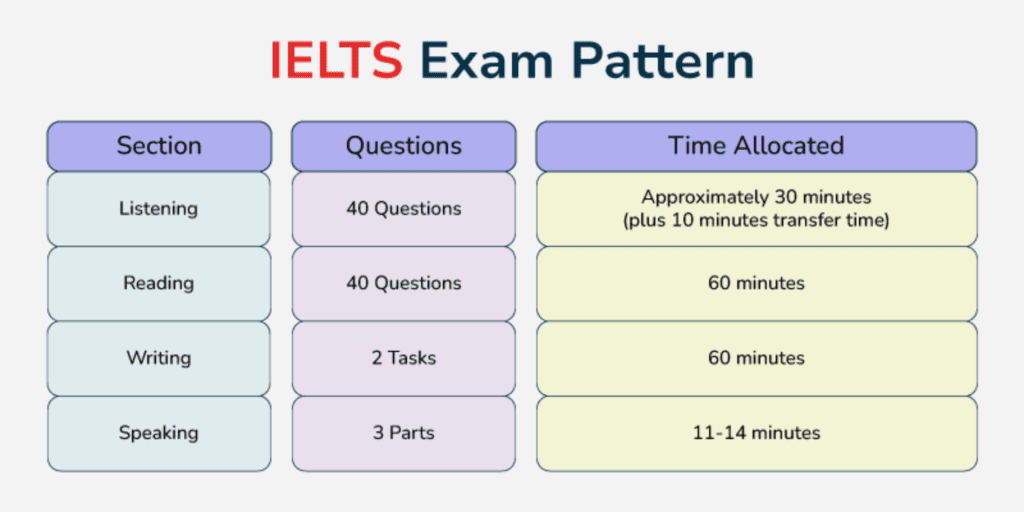IELTS Exam Preparation : Strategies and Resources

The IELTS exam, an abbreviation of the International English Language Testing System, is a most recognized and accepted language proficiency test around the globe. Whichever your destination, to seek study abroad or an opportunity for a job in English-speaking countries, the IELTS exam takes importance. Preparing for the IELTS Exam Preparation does look rather daunting; it is not easy, but with the right strategies and resources, you can approach it with confidence and maximize your chances of success.
The blog below is going to give you effective strategies that one can use While IELTS Exam Preparation with the best resources on hand for all four sections: Listening, Reading, Writing, and Speaking.

Understanding the IELTS Exam Structure
Table of Contents
Toggle
Before one embarks on preparation strategies, it is essential to have a grasp of the IELTS examination pattern. The examination tests your mastery in four major skills:
Listening (30 minutes): Here, you will be presented with an audio recording and will have to answer questions related to the audio being played. There are four sections, and the level of complexity builds up as you progress forward with the test.
Reading (60 minutes): There are three reading passages in this section with a set of questions for each passage. The content will vary between the academic and general training versions of the test.
Essay Writing (60 minutes): It consists of two tasks. First, in Task 1, you need to describe the visual representation, for example, a chart or a graph, or make a summary; in Task 2, an essay with developing a response to a question or argument.
Speaking (11-14 minutes): The speaking section is an interview with the examiner face to face. The three parts are an introduction, a given topic to be discussed, and then an in-depth conversation on it.
Effective Strategies for IELTS Exam Preparation

1. Understand the Test Format Thoroughly
Familiarize yourself with the format of the exam before preparing for it. It will give you more confidence to face the exam when you understand how each section of the exam works. You must take some time to study sample questions and become familiar with the types of tasks you’ll encounter in each section of the IELTS exam.
Example : You will need to listen carefully for details in the Listening section and quickly skim and scan for key information in the Reading section in order to answer the questions accurately. Knowing what to expect will help reduce anxiety and allow you to focus on improving your skills.
2. Take a Diagnostic Test
This early diagnostic test during preparation will be helpful in pointing out your areas of strength and weakness. It will give you an idea about the areas that you need to work on. You can also get used to the timing constraint of the IELTS exam, so that you do not run out of time when taking the actual test.
You can look for official IELTS practice tests or mock tests online. After taking the diagnostic test, go through your answers carefully to find out why you got some questions wrong. The analysis will show you areas in which you need to practice more.
3. Improve Your Listening Skills
The Listening test of IELTS demands a candidate to identify key information listening to various kinds of accents as quickly as possible. For this part, one can prepare by hearing different kinds of English accents and dialects used in Britain, America, Australia, and even Canada. All this can be done by simply watching movies in English, hearing podcasts, and following news on the English programs.
Here are some tips on how to increase your listening:
Practice with IELTS listening tests: Practising past IELTS listening tests will get you used to what kinds of questions can be asked, and what their format will be.Listen for exact details: This is what to listen for: numbers, dates, names, in the test; pay attention specifically to these and other details in the audio being played.
Practice listening to different accents: Since the recordings in the listening section come with different accents, expose yourself to a variety of English accents to ensure you are prepared.
4. Develop Your Reading Skills
The Reading section is one of the most challenging parts of the IELTS exam, especially for those who are not accustomed to reading academic texts in English. The passages can be long and complex with detailed questions that test your ability to understand the main ideas, supporting details, and inferences.
Here are some strategies to improve your reading skills:
Skim and scan: In the reading section of IELTS, you have only a limited amount of time, so it’s important that you practice skimming and scanning. Skim the text in order to get a general idea, scan for specific information in the text as you are answering your questions.
Work on your weaknesses: If you have difficulty with certain types of questions (such as true/false/not given, matching headings, or multiple choice), give yourself extra time to practice those question types.
Read often: Read academic articles, newspapers, and books in English regularly to improve your reading speed and comprehension. This will help you get used to reading long passages and getting the meaning from complex sentences.
5. Master IELTS Writing Tasks
The writing section of the IELTS test asks you to prove that you can write clearly and coherently in English. You might be required to describe a graph, chart, or diagram in Task 1, or you will need to write an essay based on a given topic in Task 2.
Preparation for the writing tasks is done as follows:
Task 1: Summarize data. Identify key trends, make comparisons, and avoid unnecessary details. Try to describe information objectively and use appropriate vocabulary.
Task 2: Write essays on different topics. Ensure your essay has a clear structure, an introduction, body paragraphs, and a conclusion. Focus on presenting a balanced argument supported by examples and avoid personal opinions without evidence.
Time yourself: The writing section has time limits. This means that to improve the rate without compromising quality, you must train to write essays under timed conditions.
Essential tips on how to write task 2:
Plan your essay before writing.
Use varied structures of sentences and vocabulary.
Staying on track and making sure your ideas flow well.
Essential tips on how to write task 2:
Plan your essay before writing.
Use varied structures of sentences and vocabulary.
Staying on track and making sure your ideas flow well.
6. Prepare for the Speaking Section
The speaking section is an oral interview with an examiner. This section is considered difficult for many test-takers since, apart from fluency, the ability to think on one’s feet and speak naturally also matters.
The following are tips on how to prepare for the speaking section:
Practice speaking English frequently: The more you speak in English, the more confident you will be. Try to speak with friends, family, or language exchange partners to get used to communicating in English.
Record yourself: The more you speak on different topics, the better you will find your mistakes in pronunciation or grammatical errors.
Familiarize oneself with common subjects: The topics of the speaking section are mainly about hobbies, family, working, and travels. Prepare and answer common questions on these subject matters.
Use a wide variety of vocabulary: Avoid repeating basic words. Use synonyms and advanced words to show the language proficiency.
7. Practice Regularly and Stay Consistent
Apert from Strategies and Resources for IELTS Preparation, Regular practice is one of the most effective ways to prepare for the IELTS exam. Each section of the exam must be devoted some time each day. Consistency is key to improvement. Plan all sections of the IELTS exam in your study plan and adhere to it.
Best Resources for IELTS Exam Preparation
The following resources can help you get ready: IELTS Website: All the sample questions, practice tests, and guides to preparation on the official site can be easily accessed. One can understand the format of the exam along with the topics.
IELTS Preparation Books: Books such as “The Official Cambridge Guide to IELTS” or “Barron’s IELTS Superpack” give an exhaustive list of practice questions for all modules.
Online Sites: Websites like IELTS Liz, IELTS Mentor, and British Council offer free practice tests, tips, and detailed explanations on every section.
Mobile Apps: Apps such as IELTS Prep and IELTS Test Pro can be used for on-the-go practice for listening, reading, and writing.
YouTube Channels: YouTube channels such as IELTS Liz and E2 IELTS offer video tutorials on various aspects of the exam, such as tips, tricks, and sample answers.
IELTS Mock Tests: Take full-length mock tests to get accustomed to the test format and timing. Many websites offer free or paid mock tests for realistic practice.
Final Tips for Success

Stay Calm on Exam Day: It’s really important to manage the stress and calmness on exam day. Plan to get plenty of sleep and eat a nutritious breakfast before test time.
Keep a Good Pacing: Time management is one aspect where the students go wrong, particularly in IELTS, and that comes with reading and writing tests. For both of those sections, set time aside within the test duration.
Check Your Answers: If you have a few minutes at the end of every section, go back and check your answers. This might help you catch some mistakes.
Prepare with confidence and conquer the IELTS exam—enroll in our expert-led IELTS course today and take the first step toward your global future!
Conclusion
All you have Learned Strategies and Resources for IELTS Preparation, It requires dedication, time, and the right approach to prepare for the IELTS exam. You will be able to maximize your chances of success if you understand the test format, use effective strategies, and make use of valuable resources. Remember, consistency is key, and regular practice across all four sections will help you perform your best on exam day. Stay focused, stay motivated, and you’ll be well on your way to achieving the IELTS score you need to reach your goals.
